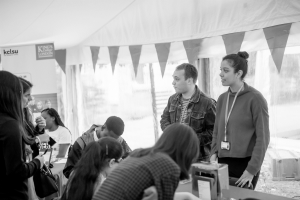
Joe Pollard, Research Associate |
Welcome to King’s! Reflecting on the importance of a good start at university
Transitioning from school to university can be one of the most challenging experiences of a student’s life. For many students, they are entering an ‘alien environment’, particularly those from non-traditional backgrounds[i]. Failure to tackle that feeling of alienation early on can result in students feeling like they don’t fit in[ii] and can impact on their likelihood of persisting at university. One element of a sense of belonging comes from the formation of positive interpersonal relationships[iii]. People want to feel accepted by others and often seek quality interactions rather than the quantity.
During Welcome Week 2018, King’s welcomed over 11,000 new students, hosted over 150 events ranging from course inductions to campus tours, and signposted the various support services available to incoming students. As this week ended, the academic journeys of our new students began.
This year at Welcome, I was on a stall, encouraging students to write postcards to former teachers. This was part of our randomised controlled trial, SHIFT (you can read more about it here). During this experience, I engaged in and heard conversations with and between students and had a chance to reflect on the importance of the experiences I was observing.
A common thread at King’s Welcome: belonging, ‘fitting in’ and friendships
Inductions provide students with an opportunity to learn about the services available to them at university, and to set the expectations around higher education. However, during my time at the stall, students often expressed their desire to make friends. Here are three examples that I saw and heard:
Students spoke to staff about their concern around making friends
For some students, events such as Welcome can be overwhelming. Being in a new environment can create apprehension and anxiety about approaching fellow students. However, at Welcome Week, incoming students have an opportunity to engage with other members of the King’s community – staff. Not only can staff members let students know of the many services available to King’s, but they can also help students to feel more at ease in their first few weeks.
Whilst at the postcard stall, I witnessed one student approach a member of staff and expressed their concern about making friends. After chatting to the member of staff, the student appeared reassured that after time, everything would be okay. Interactions like these can normalise the fact that worries about making friends or fitting in are experienced by many and can help to manage expectations of university life.
Students are determined to find commonalities with one another
Students are keen to get to know one another. For example, two students struck up a conversation whilst filling out postcards and discovered that not only were they starting the same course together, but they were also staying in the same King’s residence. Before my eyes a friendship was forming and after finishing their postcards they both went to explore the Welcome Fair together. This demonstrates the importance of creating spaces where students can simply meet; they’ll take it from there.
Many students were keen to join societies
Joining a society is a great way for students to find others who are ‘like them’; people with similar interests, cultural backgrounds and values and build quality relationships. They may also make connections that stretch beyond a perceived shared identity. These ‘bridges’ to other social networks can give students access to knowledge, opportunities and links outside of their social group[iv]. In other words, society membership can build students’ social capital.
Supporting students developing social connections underpins a good induction
Inductions like welcome weeks can provide students with a solid foundation to their degree. This foundation may enhance the experience of their first-year but can also scaffold their full academic journey. Therefore, universities should take inductions seriously. Through my reflections, a successful induction should be underpinned by staff supporting our students to develop friendships and social connections. It is true that inductions are an opportunity for students to learn about the expectations of university, to find out about the services available to them and to become oriented with their course, but these aspects will be more meaningful for our students if they share the experience with their peers.
That’s why What Works have been trialling interventions to increase society sign ups by encouraging students to attend the our Welcome Fair. Over the past few years, we have been sending messages that have addressed the common barriers for students. We have found that messages which emphasise the opportunity for students to cultivate belonging through developing friendships and joining societies can increase participation rates, especially for widening participation students.
Click here to join our mailing list.
Follow us on Twitter: @KCLWhatWorks
______________________________________________________________________________________
[i] Askham, P. 2008. Context and identity: Exploring adult learners’ experiences of higher education. Journal of Further and Higher Education 32 (1), pp. 85–97.
[ii] Thomas, L. (2012) Building student engagement and belonging in Higher Education at a time of change: final report from the What Works? Student Retention & Success programme, Paul Hamlyn Foundation
[iii] Baumeister, R. F., & Leary, M. R. (1995). The need to belong: Desire for interpersonal attachments as a fundamental human motivation. Psychological Bulletin, 117(3), 497-529. doi:10.1037//0033-2909.117.3.497
[iv] Healy,T. Côté, S. (2001)The Wellbeing of Nations : The role of Human and Social Capital, OECD Publishing


Leave a Reply